Don’t forget to send out the Sunday paper every week all of it and don’t leave out the sporting part me old dear.
22nd September 1914
The Dorsets were put on a state of alert for a return to Missy that evening but it was cancelled at the last moment. Colonel Bols, Captain Fraser and Captain Kitchin went to Missy during the day to reconnoitre. The rest of the Battalion spent the day in or near Jury.
Newspapers had gone through a revolution with the publication of the Daily Mail in 1896. New technologies such as linotype, folding machines and photographic reproduction transformed the mainstream newspaper from densely set, narrow-columned broadsheets to a tabloid layout with prominent headlines and photography. They also had the brilliant idea of putting the news on the front page.
Newspapers began to appear on Sunday with mixed success throughout the Nineteenth Century. While the News of the World thrived with its tales of scandal and murder, others like the Sunday Telegraph and The Mail on Sunday failed within a few weeks of their release in 1899.
The Observer was the only established Sunday newspaper but remained a rather Church-pleasing sober publication. Much more exciting to a young man like Frank would have been the Weekly Dispatch, a Sunday photography-led newspaper.
Sport, at the time, was dominated by football and cricket. Popular football teams in London were pretty much the same as they are today. Frank had a wide choice of teams to choose from. Chelsea and Tottenham were in the only London clubs in the top tiered First Division, while Arsenal, Fulham and Clapton Orient (later Leyton Orient) were in the Second Division. West Ham, Crystal Palace and Millwall were in the Southern Football League First Division. Frank was born a stone’s throw away from Crystal Palace, the home of the F.A. Cup final up to 1914.
1914/15 season was not a happy one for London clubs in the First Division. Chelsea finished second from bottom and Tottenham were relegated, replaced by, of all clubs, Arsenal.
Footballers in 1914 enjoyed the notoriety they do today. The 1914/1915 season was famous for a match fixing scandal in which four Liverpool and three Manchester United players were banned for life. Footballers were also accused of shirking joining the army, while the clubs were accused of bribing the players away from their military responsibilities.
After a sombre F.A. Cup final on 24th April in 1915, Lord Derby told the players: “You have played with one another and against one another for the Cup. It is now the duty of everyone to join with each other and play a sterner game for England.” There’s an excellent article about the 1914/15 football season on When Saturday Comes.
Football’s refusal to suspend the league during the first year of the war earned it a reputation as an cowardly and unpatriotic game. Subsequently its popularity as a Public School game plummeted.
Rugby Union was becoming the main sport for the upper classes. Indeed, the Telegraph lists the following article under the heading Football on the 17th September 1914.
Practically all the playing members of the famous Harlequins Rugby Club are on active service, and the captain, A. G. Stoop, has accepted a commission in the West Surrey Regiment.

